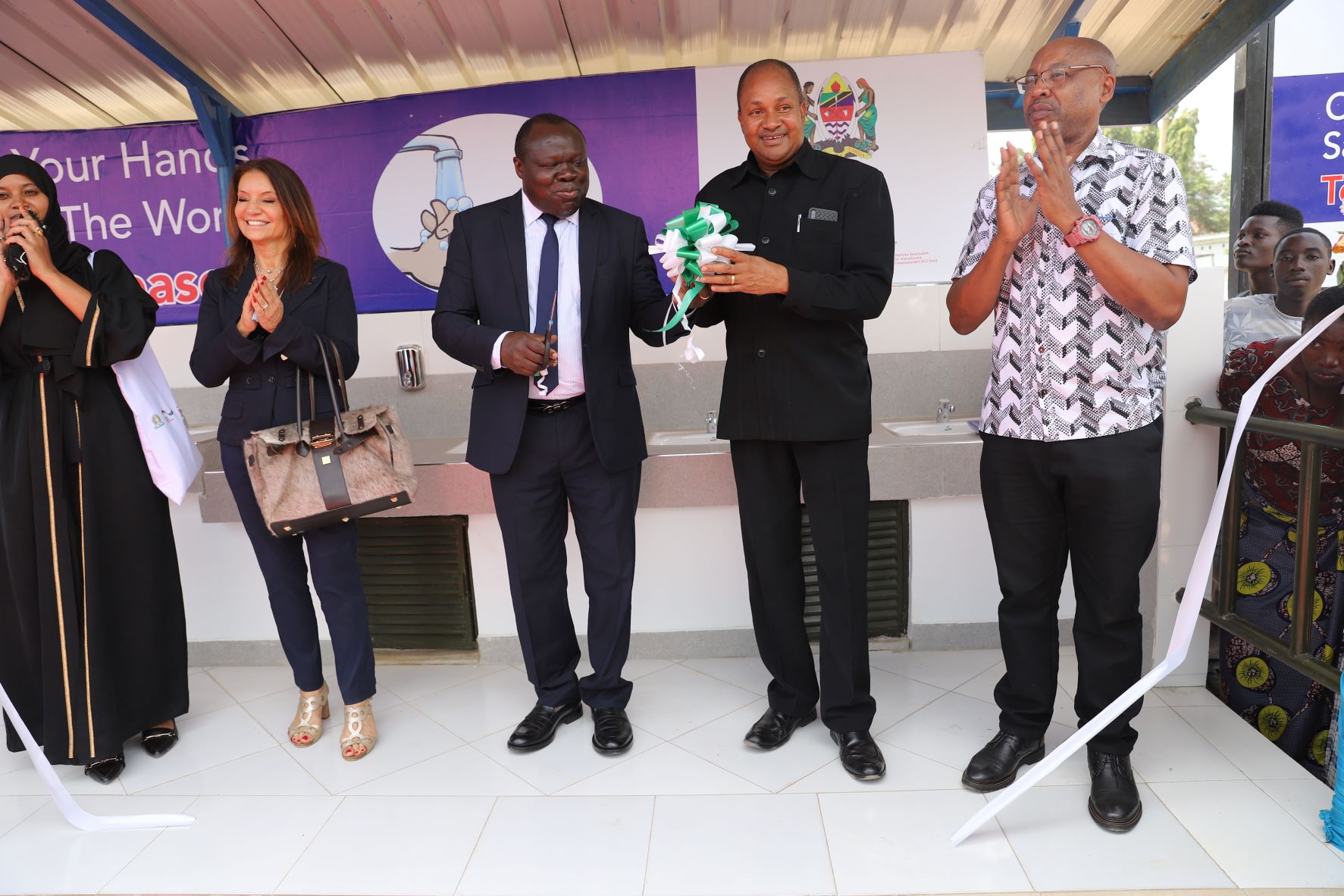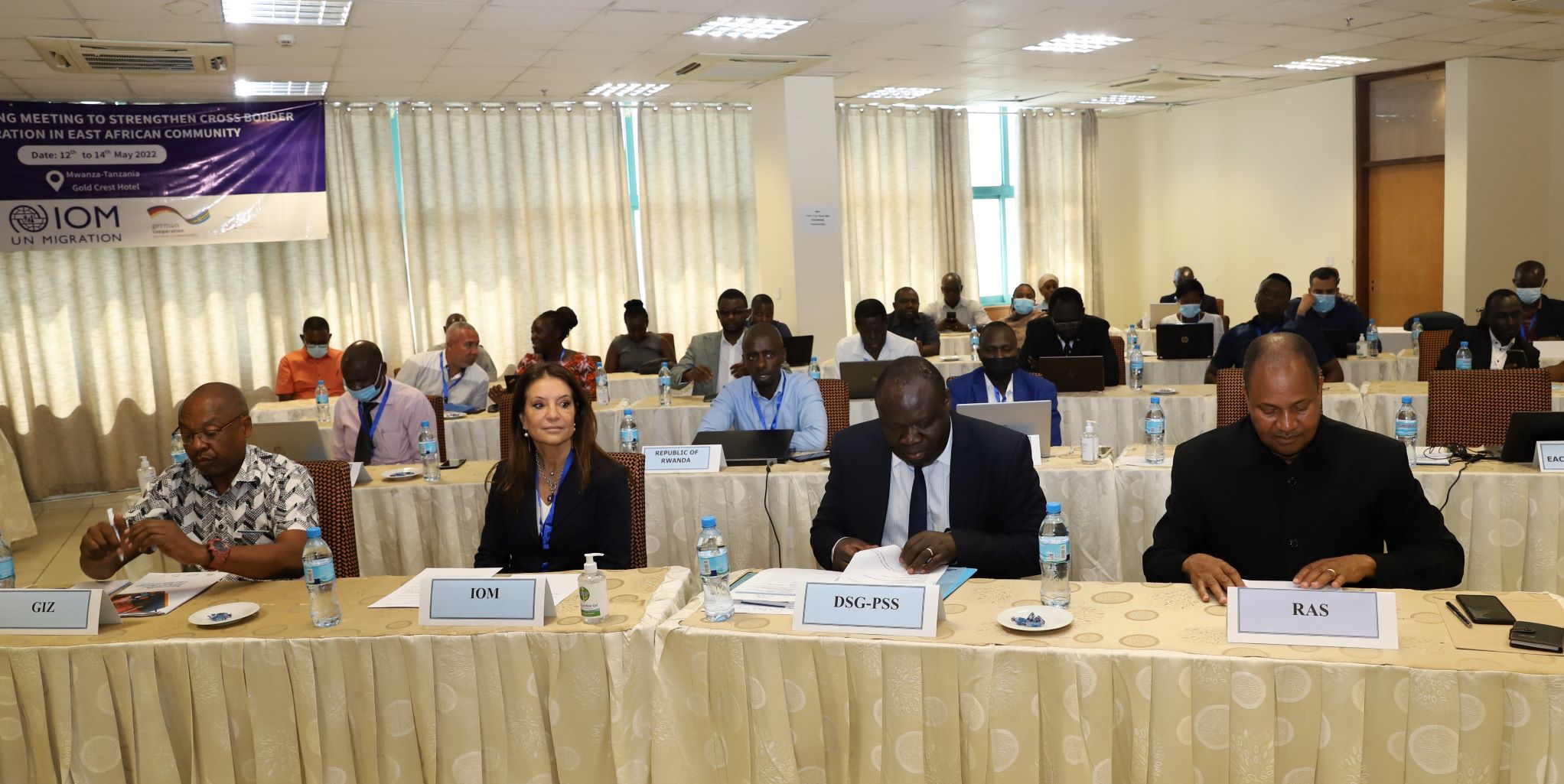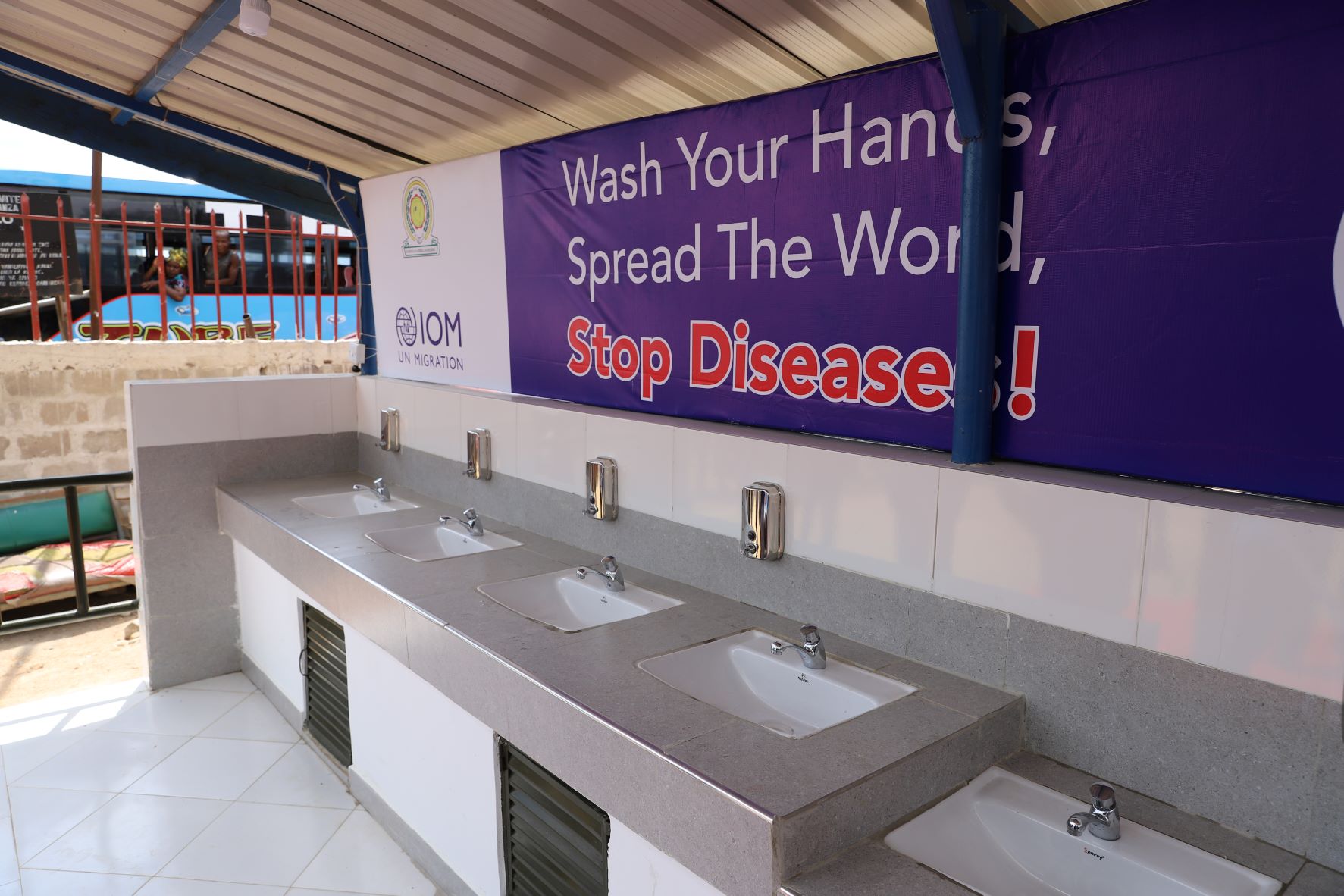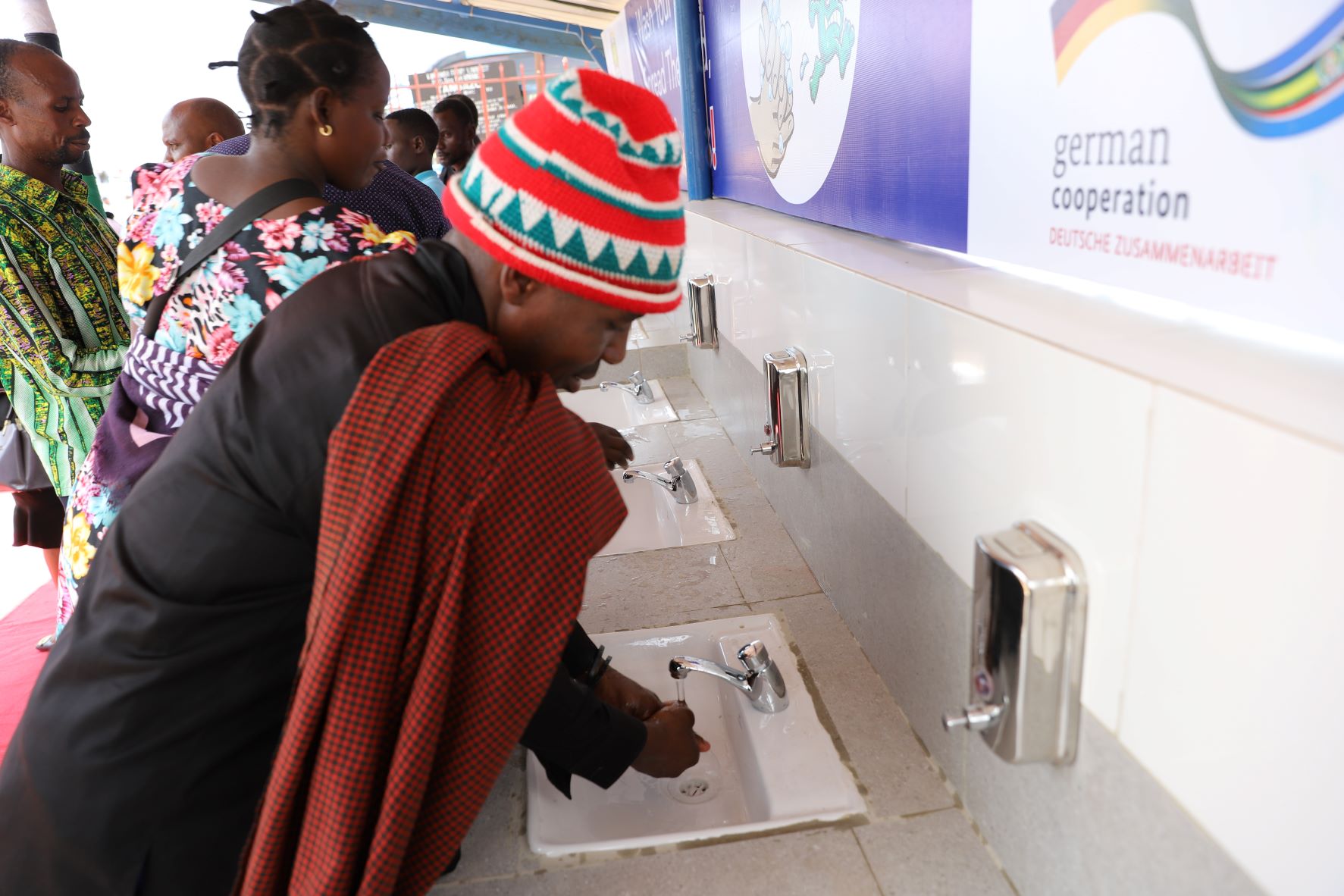
Progress made in preventing disease outbreaks as EAC hands over WASH facilities
East African Community Headquarters, Arusha, 25 May 2022: Provision of safe water, sanitation and hygiene (WASH) conditions is essential to protecting human health during all infectious disease outbreaks, including COVID-19. While it is part of the International Health Regulations (IHR, 2005) to either sanitize or wash hands regularly, not all individuals and communities are able to meet these requirements because they either don’t have access to water or lack understanding on the need to do so. The risk of exposure to and the spread of infectious diseases remains high among such individuals and communities.
To address these challenges in the East African Community (EAC) region, the EAC Secretariat in collaboration with the International Organization for Migration (IOM) implemented a project aimed at strengthening the capacity of EAC Partner States to prevent and control the spread of COVID-19 and other infectious diseases using hygiene measures, risk communication and community sensitization. The project targeted “hotspots” in the region that have a high risk for infection transmission due to crowded living conditions and a lack of clean water as causes of poor hygiene. Implementation of the project started in June 2021 through close coordination between the EAC Secretariat, IOM and relevant ministries in Partner States. It involved health and hygiene promotion initiatives and establishing handwashing and related WASH facilities in target areas.
The project has reached more than 4.7 million people with behaviour change interventions, including health and hygiene risk awareness activities and capacity building of key community influencers. This was achieved through distribution and display of Information and Educational materials, donation of WASH supplies like liquid soap and face masks and training of key influencers including community leaders, health care workers and Port Health staff. A total of 32 handwashing facilities have been constructed and connected to running water in the EAC Partner States of Burundi, Kenya, Rwanda, South Sudan, Tanzania and Uganda. Additionally, two water yards and two boreholes have been installed. Five toilet blocks and four pipeline connections to a water source have also been constructed to improve access to clean water and hygiene services.
On 14 May 2022 the project officially ended with the EAC handing over handwashing facilities to authorities at a ceremony that was held at Kamanga Point of Entry (PoE) in Mwanza, Tanzania. Kamanga is one of the 32 such WASH facilities. Similar facilities are located at Nemba/Gasenyi at the border between Burundi and Rwanda, and Kobero and Mugina bordering Burundi and Tanzania. In Kenya, the facilities are located at Lungalunga at the Kenya and Tanzania border, Miritini truck parking area in Mombasa, Eastleigh Urban community and Namanga bordering Tanzania and Kenya.
In Rwanda the handwashing facilities are at Rubavu One Stop Border Post between DRC and Rwanda, Rusumo One Stop Border Post between Tanzania and Rwanda, Kagitumba One Stop Border Post between Rwanda and Uganda and Rusizi Border Post between Rwanda and DRC. In South Sudan the project covered Nimule at the South Sudanese and Ugandan border, Juba and Wau airports. In Uganda the WASH facilities are at Mutukula bordering Uganda and Tanzania; Kasensero, a landing site located in the South-Western Region within the borders of Uganda and Tanzania and Elegu bordering Uganda and South Sudan. In Tanzania, in addition to Kamanga in Mwanza, others WASH facilities have been constructed at Mutukula in Kagera Region, at the border between Tanzania and Uganda, Namanga bordering Tanzania and Kenya and Malindi harbour port in Zanzibar.
The handwashing facility at Kamanga was handed over to the government of Tanzania. The handover ceremony was preceded by a regional meeting held in the city from 12-14 May 2022 bringing together national authorities and experts from across the EAC region, including national focal points for the WASH project. The meeting aimed to identify and address gaps in strengthening cross border preparedness and response and promote regional standards and policies in accordance with the International Health Standards (IHS). The forum provided an opportunity for participants to share experiences lessons from the project, understand the current cross border situation on health and WASH as well as operational modalities to strengthen cross border coordination.
“The project has helped increase awareness and enhance health and hygiene protective behaviors and practices to prevent and respond to the spread of infectious diseases including COVID-19 in EAC region,” said Hon. Christophe Bazivamo, the EAC Deputy Secretary General Productive and Social Sectors, who officially handed over the handwashing facility to Tanzania government authorities. Bazivamo emphasized the need to authorities in Partner States to ensure that the infrastructure provided through the project is properly managed and maintained. He thanked the German Government for financing this and other projects in the EAC. He reiterated the need to strengthen cross border collaboration in the region to address disease outbreaks and protect migrants and cross border communities.
Mohammed Abdiker, IOM Regional Director for the East, and Horn of Africa said, “Population mobility across borders is one of the main factors that drove the spread of COVID-19 and made the pandemic so complex and difficult to contain. IOM shall continue its support to national public responses for COVID-19 and other pandemics. IOM will contribute to strengthening the capacities of institutions and health personnel building on lessons learnt from our current interventions.”
Speaking on behalf of the Tanzania government during the handover ceremony, the Mwanza Regional Administrative Secretary, Joachim Otaru, said the Mwanza City Council would take over maintenance of the facility and ensure its sustainability. He urged members of the public to make good use of the facility and thanked the EAC, IOM and the German Government for construction of the facility and risk and crisis communication and community sensitization activities.
The 1.8 million Euro project was financially and technically supported by the German Government through the “Support to Pandemic Preparedness in the EAC Region” project, and implemented through the Deutsche Gesellschaft für Internationale Zusammenarbeit (GIZ) GmbH in close cooperation with the EAC Secretariat. Direct implementation was in all six Partner States through IOM country offices and National Focal points from relevant ministries, local government authorities, border authorities, other stakeholders and implementing partners. An analysis of behaviour change assessment as a result of the project is currently being undertaken by IOM in collaboration with the Aga Khan University.
The Treaty for the Establishment of the EAC provides for joint action towards the prevention and control of epidemics of communicable and vector-borne diseases, as well as pandemics, that might endanger the health and welfare of the residents of the Partner States. The COVID-19 pandemic has shed the spotlight on the need to focus on improving the region’s ability to respond to the special requirements of cross-border preparedness and response and address the needs of migrants and cross border communities.
ENDS.


